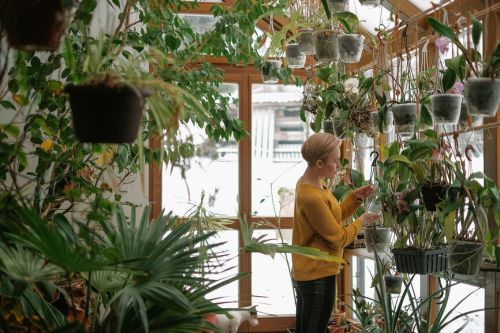6 easy ways to keep your indoor plants alive during the dark days of winter
As temperatures fall and skies darken, your houseplants require a different kind of care—here's how to keep your indoor plants alive.

Baby, it’s cold outside, and since your indoor plants can’t exactly slip on a sweater—or strip down to their skivvies if you can’t control the heat in your apartment—the change in season means attending to them with a little extra care. This is somewhat counterintuitive, at least to me, as I feel most dedicated to my plants when sweltering temps are dehydrating them; however, all sorts of seasonal factors could be making your plants sad right now.
To get some intel into what needs to be done to make them happy again—aside from tuning in to this Spotify “Music for Plants” playlist—I tapped Erin Marino of plant shop The Sill. Below, Marino offers her best advice for how to keep your indoor plants alive and healthy through the chilly season’s most brutal days, so they can thrive again come spring.
How to keep your indoor plants alive through the winter
1. Increase the light
The sun (depressingly, IMO) sets earlier in the winter, and Marino points out that it’s also lower in the sky and can often be covered by clouds. “To make sure your indoor plants are getting enough light during this time of year, you might want to move them closer to their natural light source, the window, or give them some supplemental lighting,” she says. To this end, The Sill sells a grow light so stylish you don’t have to hide it, or you could try making this DIY grow light instead. “If you find your plants are leaning towards the window, you can gradually rotate them every few days to make sure they’re receiving natural light on all sides.”
2. stabilize temperatures
Plants don’t like extreme changes in temperature, says Marino, so it’s important to move them away from open windows and doors, heating units and radiators, and even ovens (assuming you use yours). “Keep their surroundings as temperature stable as possible—don’t let them get cold and drafty, or hot and dry,” she says.
3. Give them a rest
“Thanks to shorter days and less sunshine, plants feel sleepy in the winter just like us,” Marino says. “Some tropical plants will go into a state of dormancy or semi-dormancy from October to February.” (Who knew/how cute!) Plus, since plants only take up water based on the amount of light they receive, she explains, you probably won’t have to water your plants as often this time of year as you do in sunnier seasons. “Wait longer between waterings , or reduce the amount you’re watering each time,” she advises. “Allow the potting soil to dry out completely between waterings to avoid root rot.”
4. Don’t forget to dust
One of the worst things about winter, IMO, is that spaces get stuffy due to the battening down of the hatches. Apparently, plants aren’t fond of this phenomenon either. “Closed windows during the winter months can increase dust in your space,” says Marino. “And that dust build-up—whether on your plants or on your window—can reduce the amount of light getting to your plants.” Since they’re getting such little sunshine this time of year as it is, this obscuration can be deadly. “Gently dust off leaves every week or two. For extreme build-up, try some mildly soapy water and a soft cloth.”
5. Skip fertilizer
As Marino mentioned earlier, plants get pretty sleepy this time of year, which means that in at least one respect, you get to be lazier, too. “Your plant is doing everything at a slower pace during the winter—including growing,” she says. “It generally won’t benefit from any added nutrients at this time, so give it a break from fertilizer.”
6. Don’t mind the winter blues
This final tip comes not a moment too soon for me, as I was about to leave one of my houseplants—newly naked—for dead. Marino, however, says not to count it out just because it’s lost its leaves. “Come winter, you might find your houseplants dropping more leaves than they usually do,” she explains. “Don’t fret—plants drop their leaves to compensate for the lack of light, and in turn, the lack of food.” It’s normal, in other words, for your plant to look a little less flamboyant now than it did in the summer months. “Feel free to help it with some very slight trimming if you’d like,” she says, noting that doing so can help prevent further leaf loss.
Not yet a plant lady (or gent)? Try this zodiac guide to get yourself started with the perfect greenery. Plus, here’s why you should be feeding your plants “worm tea.”
Sign Up for Our Daily Newsletter
Get all the latest in wellness, trends, food, fitness, beauty, and more delivered right to your inbox.
Got it, you've been added to our email list.









